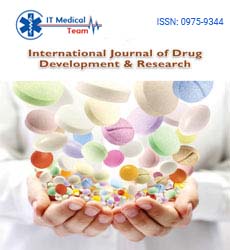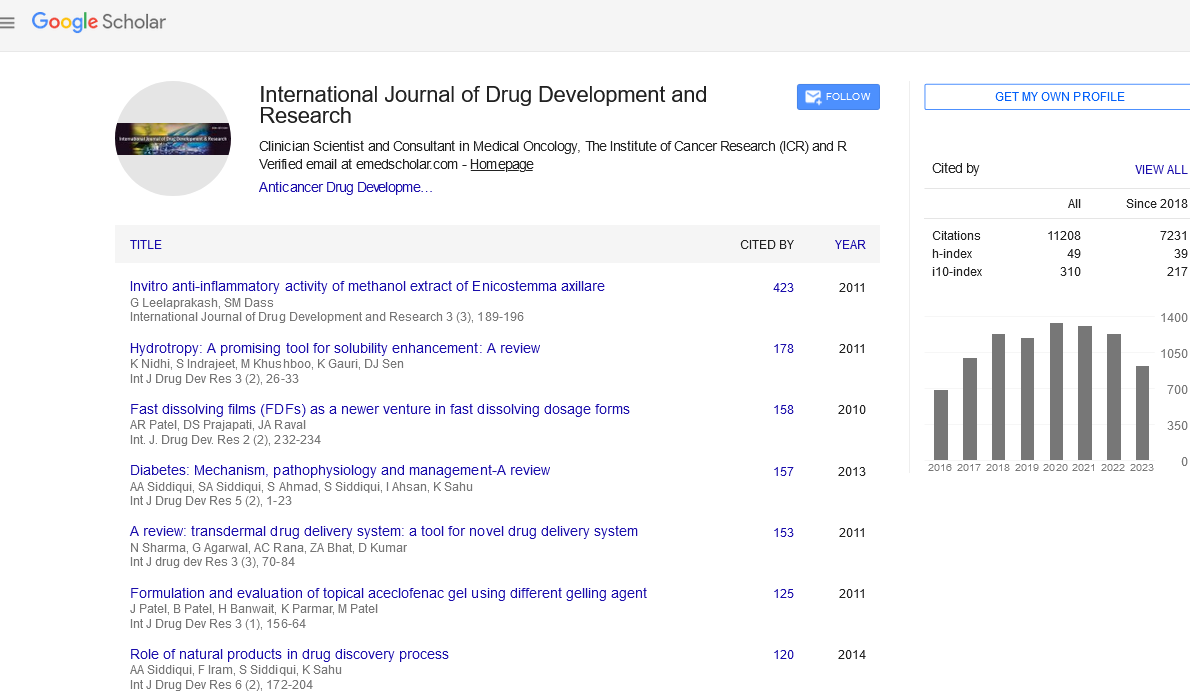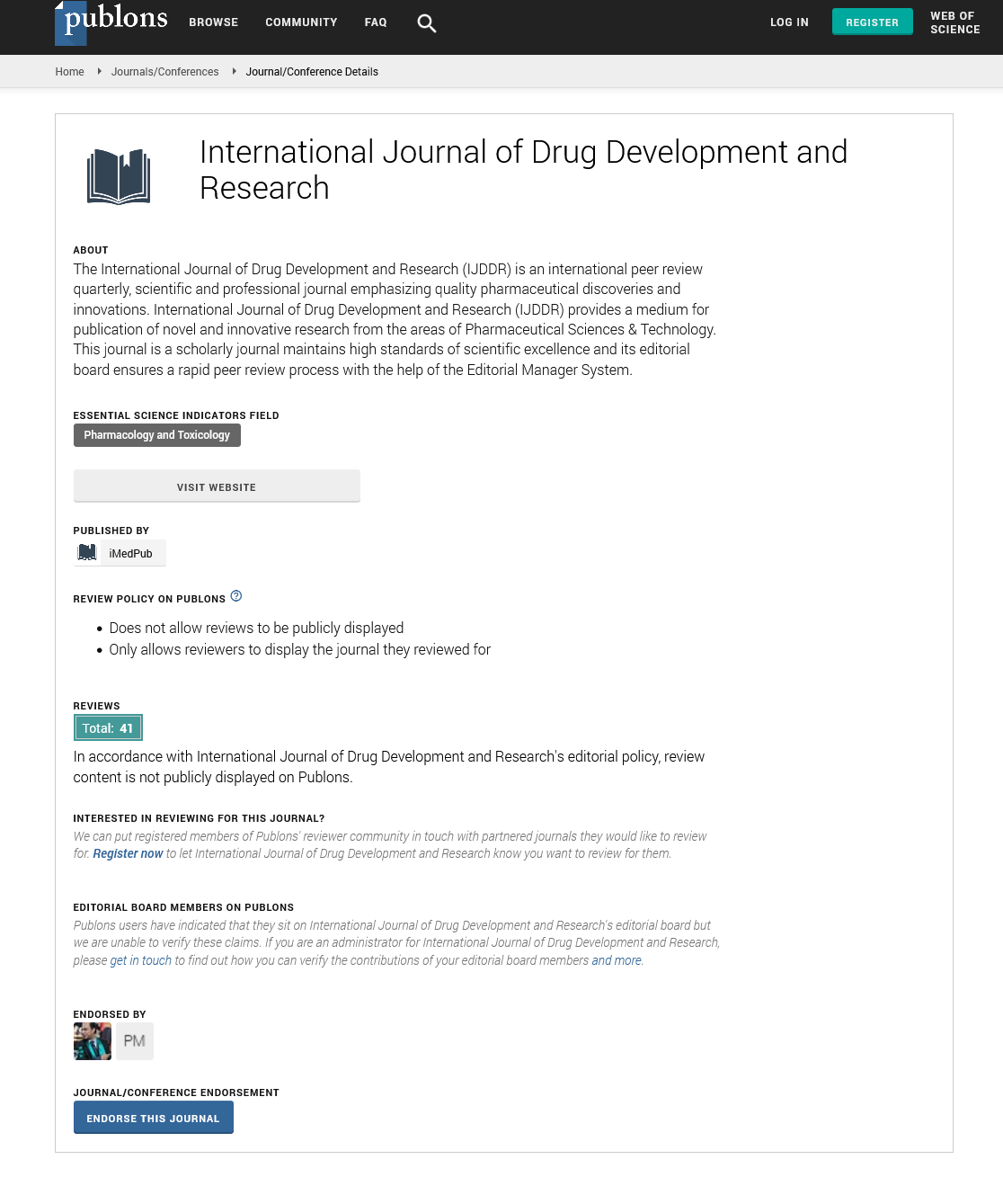Perspective - (2024) Volume 16, Issue 5
The Impact of Global Health Crises on Drug Research and Development
Gonalzu Moangue*
Department of Molecular Research, University of Antwerp, Antwerp, Belgium
*Correspondence:
Gonalzu Moangue, Department of Molecular Research, University of Antwerp, Antwerp,
Belgium,
Email:
Received: 02-Sep-2024, Manuscript No. IJDDR-24-15199;
Editor assigned: 04-Sep-2024, Pre QC No. IJDDR-24-15199 (PQ);
Reviewed: 18-Sep-2024, QC No. IJDDR-24-15199;
Revised: 10-Oct-2024, Manuscript No. IJDDR-24-15199 (R);
Published:
17-Oct-2024
Introduction
Global health crises, from pandemics to emerging infectious
diseases, have a profound impact on drug Research and
Development (R and D). These crises can accelerate innovation,
shift research priorities, and reveal both vulnerabilities and
strengths in the global healthcare system. This article examines
how global health crises influence drug R and D, focusing on
historical and recent examples, the challenges faced, and the
opportunities that arise from these crises.
Description
Historical context: Lessons from the past
The HIV/AIDS crisis: The HIV/AIDS epidemic of the late 20th century was a pivotal moment for drug R and D. The urgency to
address the crisis spurred rapid advancements in Antiretroviral
Therapy (ART). Historically, the development of ART was marked
by unprecedented collaboration between governments, non-profit
organizations, and pharmaceutical companies. For
instance, the creation of the first antiretroviral drug, AZT, was a
direct result of the accelerated research efforts prompted by the
crisis.
The epidemic also highlighted the importance of global
collaboration and community engagement in drug development.
Activist groups played a crucial role in advocating for more
research and affordable medications, leading to the eventual
development of a broad range of ART options and improvements
in treatment regimens.
The influenza pandemic of 1918
The 1918 influenza pandemic, or Spanish flu, was another
historical event that significantly impacted drug R and D.
Although antiviral drugs were not available at the time, the crisis
emphasized the need for better vaccines and treatments for
influenza. The pandemic led to increased funding and research
into influenza virology and vaccine development, setting the
stage for modern vaccine research and production methods.
Recent crises: The COVID-19 pandemic
Accelerated vaccine development: The COVID-19 pandemic
represents one of the most dramatic examples of how a global
health crisis can impact drug R and D. The urgent need for a
vaccine led to an unprecedented acceleration in research and
development processes. The rapid development of COVID-19
vaccines, such as those from Pfizer-BioNTech and Moderna,
demonstrated the potential for innovative approaches, such as
messenger RNA (mRNA) technology, to produce safe and
effective vaccines in record time.
The collaborative effort between governments, private
companies, and international organizations, exemplified by
initiatives like Operation Warp Speed, showcased the power of
public-private partnerships in overcoming global health
challenges. This collaboration not only expedited vaccine
development but also set new standards for regulatory flexibility
and scientific innovation.
Therapeutic advancements: In addition to vaccines, the
COVID-19 pandemic spurred significant advancements in
therapeutic drug development. Treatments such as remdesivir
and monoclonal antibodies were rapidly developed and brought
to market. The crisis highlighted the need for a diverse arsenal of
treatments to manage and mitigate the effects of a novel virus,
leading to new research into antiviral drugs and treatment
regimens.
Supply chain and manufacturing challenges: The pandemic
also exposed vulnerabilities in global supply chains and drug
manufacturing. Disruptions in the production and distribution of
essential medicines, particularly for chronic diseases,
underscored the need for more resilient and adaptable supply
chains. The pandemic prompted a reevaluation of
manufacturing practices, leading to increased interest in
decentralized production and strategies to ensure the availability
of critical drugs and vaccines during emergencies.
Challenges in drug research and development during
crises
Funding and resource allocation: Global health crises often
strain financial and human resources, posing challenges for drug
R and D. While crises can lead to increased funding for specific
areas, they may also divert resources from other important research areas. Balancing the allocation of funds between
immediate crisis response and ongoing research priorities is a
complex challenge that requires careful management.
Regulatory hurdles: The need for expedited drug
development during a crisis can lead to regulatory challenges.
While accelerated approval processes can speed up the
availability of new treatments, they also raise concerns about
ensuring safety and efficacy. Regulatory agencies must navigate
the delicate balance between rapid development and rigorous
evaluation to ensure that new drugs meet high standards of
safety and effectiveness.
Scientific and logistical hurdles: The rapid pace of research
during a crisis can lead to scientific and logistical challenges. For
example, the need to conduct large scale clinical trials quickly
can strain existing infrastructure and require innovative
approaches to trial design and participant recruitment. Ensuring
the integrity and validity of research data while maintaining an
accelerated timeline is a critical challenge.
Opportunities and innovations arising from crises
Accelerated innovation: Global health crises often drive
innovation by creating an urgent need for new solutions. The
COVID-19 pandemic, for example, accelerated the development
of mRNA vaccine technology, which has the potential to
revolutionize vaccine development for other infectious diseases
and even cancer. Similarly, the need for rapid testing during the
pandemic led to the development of new diagnostic
technologies and methodologies.
Enhanced collaboration: Crises highlight the importance of
collaboration between governments, industry, academia, and
non-profit organizations. The COVID-19 pandemic demonstrated
how international partnerships and data sharing can lead to
faster and more effective responses. Future crises may benefit
from the collaborative models established during the pandemic,
fostering a more integrated and cooperative approach to drug R
and D.
Strengthened infrastructure
The challenges faced during global health crises can lead to
strengthened research and healthcare infrastructure. Investments
in research facilities, data management systems, and supply chain
resilience made during a crisis can have long lasting benefits for
future drug development efforts. Additionally, the increased focus
on pandemic preparedness can lead to improved strategies for
managing future health emergencies.
The future of drug research and development
The impact of global health crises on drug R and D is likely to
continue shaping the field in profound ways. As new health
challenges emerge, the lessons learned from past and present
crises will inform future research priorities and strategies. The
need for rapid and effective responses will drive continued
innovation and collaboration, leading to advancements in drug
development and global health preparedness.
Future drug R and D efforts may increasingly focus on
integrating technologies such as artificial intelligence and
genomics to accelerate discovery and development processes.
Additionally, the experiences gained from managing global
health crises will contribute to the development of more
resilient and adaptable research and healthcare systems.
Conclusion
Global health crises have a significant impact on drug research
and development, driving innovation, collaboration, and
adaptation. While these crises pose challenges, they also create
opportunities for advancements that can benefit global health in
the long term. By learning from past experiences and applying
the insights gained during recent crises, the field of drug R
and D can continue to evolve, offering new solutions and
improving the ability to respond to future health challenges.
Citation: Moangue G (2024 The Impact of Global Health Crises on Drug Research and Development. Int J Drug Dev Res Vol:16 No:5






